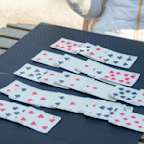Search results
Results from the WOW.Com Content Network
Not all optical prisms are geometric prisms, and not all geometric prisms would count as an optical prism. Prisms can be made from any material that is transparent to the wavelengths for which they are designed. Typical materials include glass, acrylic and fluorite .
Lamps as seen through a prism. In optics, a dispersive prism is an optical prism that is used to disperse light, that is, to separate light into its spectral components (the colors of the rainbow ). Different wavelengths (colors) of light will be deflected by the prism at different angles. [1] This is a result of the prism material's index of ...
Optical glass refers to a quality of glass suitable for the manufacture of optical systems such as optical lenses, prisms or mirrors.Unlike window glass or crystal, whose formula is adapted to the desired aesthetic effect, optical glass contains additives designed to modify certain optical or mechanical properties of the glass: refractive index, dispersion, transmittance, thermal expansion and ...
Crown glass is a type of optical glass used in lenses and other optical components. It has relatively low refractive index (≈1.52) and low dispersion (with Abbe numbers between 50 and 85). Crown glass is produced from alkali-lime silicates containing approximately 10% potassium oxide and is one of the earliest low dispersion glasses .
Maybe. "They might work for some people," Dr. See says. "But when you look at it systematically, there isn’t evidence that it helps." Here's why they might help anecdotally, though. "Blue light ...
Not really. "Some people need glasses when they're young—before 45," explains , of Cleveland Clinic’s Cole Eye Institute. "If you don't need glasses before your 40s, chances are you will need ...
Optical coating. An optical coating is one or more thin layers of material deposited on an optical component such as a lens, prism or mirror, which alters the way in which the optic reflects and transmits light. These coatings have become a key technology in the field of optics. One type of optical coating is an anti-reflective coating, which ...
Punch a pinhole into the aluminum foil and tape it over one side of the box. Tape the white sheet of paper to the inside of the other side of the box. Stand with the sun behind you. Light will ...
Glass is an amorphous or non-crystalline solid. Because it is often transparent and chemically inert, glass has found widespread practical, technological, and decorative use in window panes, tableware, and optics. Some common objects made of glass like "a glass" of water, "glasses", and "looking glass", have become named for their material.
Those eclipse glasses that helped you see Monday's celestial phenomenon don't really have many other practical purposes, so what are you supposed to do with them now?. You can recycle your eclipse ...



